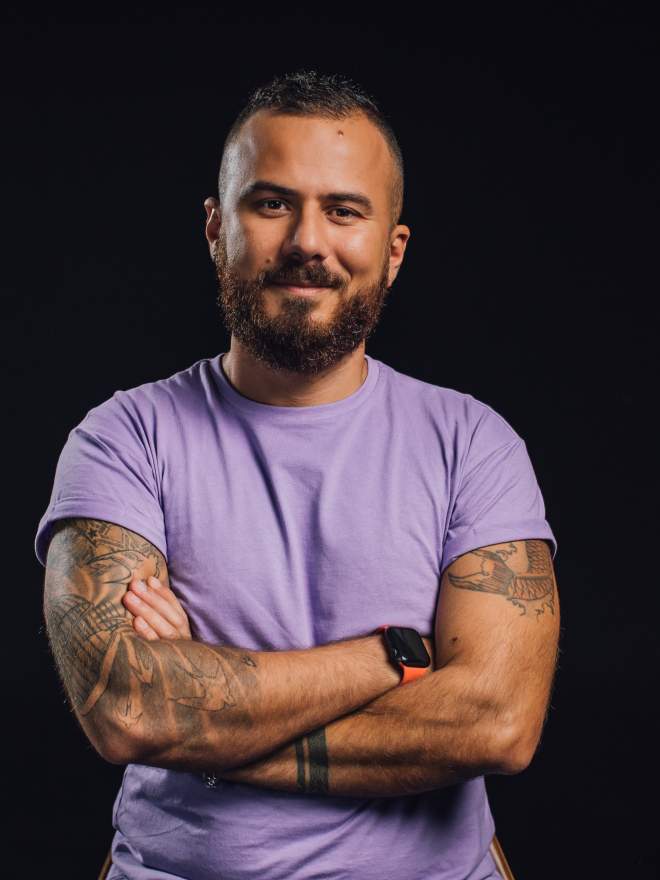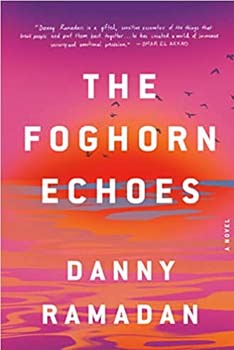THE FOGHORN ECHOES is an eloquent novel of physical and emotional displacement told primarily by two narrators whose demoralized voices chronicle survival as gay Muslim Arabs on opposite sides of the globe. Syrian-Canadian author Danny Ramadan begins the novel in 2003, when the American war in Iraq is rattling the Middle East. Amid the turmoil, two adolescent friends, Hussam and Wassim, begin to recognize their attraction for one another. After Hussam’s father catches them in an embrace, Wassim, in a moment of blind panic, accidently causes the death of his friend’s father. Several years later, the Syrian War is raging and the young men are living with Wassim’s family when Wassim’s father catches them together, this time in a loving moment of post-coital bliss. Enraged, he banishes Hussam and forces Wassim into an arranged marriage.
From there, their paths diverge. Eventually Wassim abandons his wife and child and shelters in a bombed-out Damascus building while he looks for Hussam. Starving, filthy, and frightened, he is unwilling to live the lie he was assigned by his family, religion, and culture. Unable to forgive himself, the separation from Hussam is intolerable. It is months before a glimmer of relief comes, albeit in the form of a ghost. A woman who was murdered by her husband for her inability to bear children, Kahlila now lives an ectoplasmic life in what was previously her family home, and decides to gradually appear to Wassim. Kahlila is tenderly drawn, even when her dialog occasionally strays into greeting-card affirmation. She’s more than his housemate; Kahlila becomes his therapist, his mischievous playmate, and the loving friend who finally pushes him out of hiding to try to rejoin the world. Eventually, after dangerous false starts, Wassim begins, little by little, to make a life for himself with the kindness of a shop owner. While traumatized by being branded less than a man by his country due to the shame he has brought to his family, Wassim remains decidedly unwilling to leave Syria. Hussam, on the other hand, responds to his situation by joining the anti-Assad protests. He is arrested and later escapes to Turkey, then moves to Vancouver with the help of an older white man, a controlling boyfriend and sponsor. In Canada, Hussam faces daily agonies for which he has no name. Ghoulish visions of his dead father appear whenever a man finds Hussam attractive, as well as before, during, and after he has sex. Hussam’s path to self-destruction is charted by substance abuse and random hookups, which the reader witnesses in vivid detail. This is a love story that collapses in on itself before it begins. The lovers are isolated with little to no hope of reintegration, both of them miserable as they continue to be menaced by the horrors of their past. Ramadan persuasively interlocks their narratives as the story jarringly swings back and forth between Damascus and Vancouver, each city a distinct kind of hell, each man suffering alone. What the reader knows but the characters can’t see is that, even though they’re physically apart, each remains the most present and consuming person in the other’s life. Hussam and Wassim’s incorrect assumptions about what the past means to the other, and how or what the other is thinking and feeling, are some of the most painful aspects of their deeply troubled relationship. But there are even darker secrets they carry, unspoken until Hussam unburdens himself to a sympathetic Syrian-Canadian named Dawood, an immigrant advocate and weekend drag queen. Wassim is finally able to tell Khalila the truth about what happened—what keeps him hungry, cold, and in hiding. Both men also happen to be creative, resourceful, and intelligent. Although those qualities don’t save them from their torments, they do help them to endure from day to day. Hussam has a particularly good sense of humor and the disarming ability to accurately imagine how sex will play out with the men who flirt with him. As an immigrant, he learns what it means to be a minority within a minority for the first time, to experience the misperceptions people have about him based on his appearance, name, or national origin. Upon regaining consciousness in a hospital bed, without knowing how or why he got there, Hussam opens his eyes to see an eraser board across from his bed on which he has been identified as a white male. He immediately begins shouting: “I’m not white!” One of the delights of this novel is how Ramadan weaves in subtle and not-so-subtle details about the cultural fusion between these pointedly disparate societies. Years after their separation, Wassim—in a rare moment of relief following his first encounter with the compassionate shopkeeper—wanders Damascus in the middle of the night, whistling to himself a tune Hussam used to sing, the lyrics of which he can’t quite remember—something about “finding a place for us, somewhere peaceful and quiet with open air.” Ramadan deftly captures what it means to be a homosexual in a deeply religious culture racked with political violence, where nearly every aspect of life is dictated by tradition and the Koran, which in turn is driven by the patriarchal and the masculine. The author also shines light on a gay man’s immigrant experience and the freedoms he doesn’t yet know how to navigate. Even with all that, it is the crippling wounds of shame and guilt that most dominate Hussam and Wassim’s lives, keeping them apart. Do they eventually reconnect? Fortunately, Ramadan crafts a satisfying conclusion without sugarcoating the adversity these men will continue to face.
Thomas Keith’s writing has appeared in American Theatre, The Drouth, and Studies in Scottish Literature.





